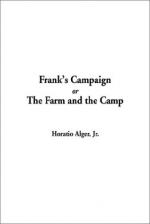“Toward the close of the afternoon General Howard’s division, to which I belong, crossed the pontoon bridge whose building had cost us more than one gallant soldier. The distance was short, for the Rappahannock at this point is not more than a quarter of a mile wide. In a few minutes we were marching through the streets of Fredericksburg. We gained possession of the lower streets, but not without some street fighting, in which our brigade lost about one hundred in killed and wounded.
“For the first time I witnessed violent death. The man marching by my side suddenly reeled, and, pressing his hand to his breast, fell forward. Only a moment before he had spoken to me, saying, ‘I think we are going to have hot work.’ Now he was dead, shot through the heart. I turned sick with horror, but there was no time to pause. We must march on, not knowing that our turn might not come next. Each of us felt that he bore his life in his hand.
“But this was soon over, and orders came that we should bivouac for the night. You will not wonder that I lay awake nearly the whole night. A night attack was possible, and the confusion and darkness would have made it fearful. As I lay awake I could not help thinking how anxious you would feel if you had known where I was.
“So closed the first day.
“The next dawned warm and pleasant. In the quiet of the morning it seemed hard to believe that we were on the eve of a bloody struggle. Discipline was not very strictly maintained. Some of our number left the ranks and ransacked the houses, more from curiosity than the desire to pillage.
“I went down to the bank of the river, and took a look at the bridge which it had cost us so much trouble to throw across. It bore frequent marks of the firing of the day previous.
“At one place I came across an old negro, whose white head and wrinkled face indicated an advanced age. Clinging to him were two children, of perhaps four and six years of age, who had been crying.
" ‘Don’t cry, honey,’ I heard him say soothingly, wiping the tears from the cheeks of the youngest with a coarse cotton handkerchief.
" ‘I want mama,’ said the child piteously.
“A sad expression came over the old black’s face.
" ‘What is the matter?’ I asked, advancing toward him.
" ‘She is crying for her mother,’ he said.
" ‘Is she dead?’
" ’Yes, sir; she’d been ailing for a long time, and the guns of yesterday hastened her death.’
" ‘Where did you live?’
" ‘In that house yonder, sir.’
" ‘Didn’t you feel afraid when we fired on the town?’
" ’We were all in the cellar, sir. One shot struck the house, but did not injure it much.’
" ‘You use very good language,’ I could not help saying.
" ’Yes, sir; I have had more advantages than most of—of my class.’ These last words he spoke rather bitterly. ’When I was a young man my master amused himself with teaching me; but he found I learned so fast that he stopped short. But I carried it on by myself.’




